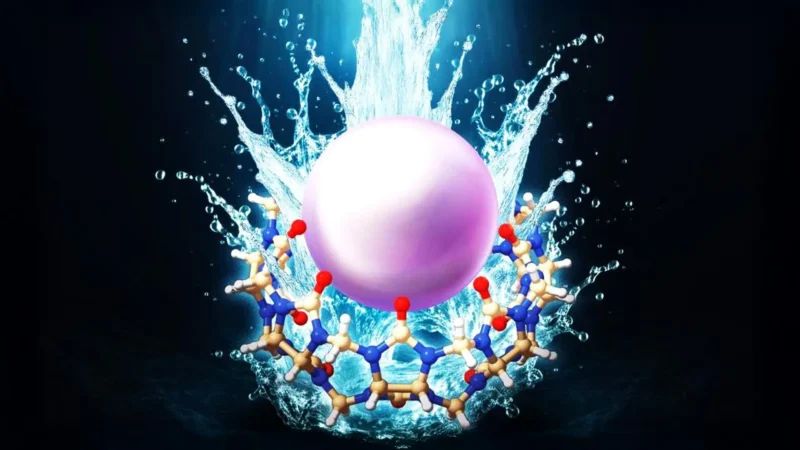Top Highlights
-
Confined Water’s Influence: Researchers identified that water trapped in tiny molecular spaces can actively influence molecular interactions, enhancing binding strength rather than remaining passive.
-
Highly Energetic Water: This newly characterized “highly energetic” water holds more energy than regular water and can significantly aid in the bonding processes when other molecules enter confined spaces.
-
Study Methodology: By using cucurbit[8]uril as a model, the team demonstrated through computer simulations that energetic water enhances binding forces, supporting the theory of its active role in molecular binding.
-
Implications for Innovation: The findings could revolutionize drug development and materials science by allowing for the design of molecules that utilize confined water’s energy to improve drug efficacy or enhance material properties.
The Surprising Role of Confined Water
Water is omnipresent. It fills oceans, flows through our veins, and even occupies tiny molecular spaces within proteins. For years, scientists have debated whether water in cramped areas acts as a mere bystander or actively influences molecular behavior. Recent research reveals a new perspective. Confined water can indeed affect how molecules interact, showing that its role extends beyond traditional beliefs. Instead of remaining uninvolved, this water displays a unique state known as “highly energetic.” Researchers found that when other molecules approach, this energetic water rushes out, facilitating stronger bonds between molecules. This finding highlights water’s dynamic nature and its impact on interactions at the molecular level.
Revolutionizing Medicine and Materials
Understanding how highly energetic water influences molecular binding opens new doors in various fields. In drug design, for instance, chemists can aim to strategically remove this energetic water. This targeted approach could enhance the effectiveness of medications by ensuring drugs bind more securely to their protein targets. Meanwhile, materials scientists can leverage knowledge about water’s behavior to create advanced sensors or storage materials with improved capabilities. The possibilities extend far beyond medicine, potentially shaping future technologies. This breakthrough not only sheds light on the hidden complexities of water but may also pave the way for significant innovations in enhancing human health and technology.
Expand Your Tech Knowledge
Explore the future of technology with our detailed insights on Artificial Intelligence.
Stay inspired by the vast knowledge available on Wikipedia.
TechV1

